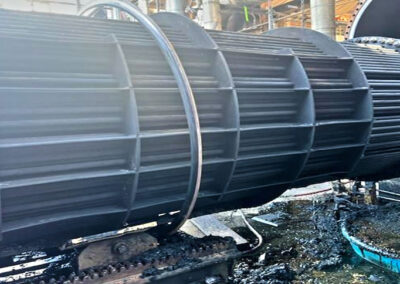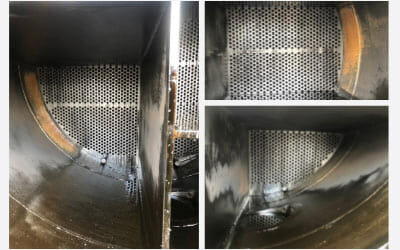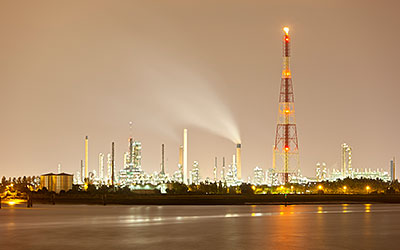Refinery
Alkylation Scaling
Using chemical cleaning to remove alkylation scaling decontaminates both the inorganic scales and organic deposits that cause fouling throughout the unit.

Chemicals Utilized
Alkylation Process
After the Hydrocracker separates light olefin products, the alkylation unit converts it to larger molecules. These larger molecules blend into gasoline stocks. The promotion of alkylation reactions is through a catalyst of sulfuric or hydrofluoric acid. Alkylation scaling becomes a problem because of the use of an acid process.
1
The cracked olefins from the hydrocracker mix with iso-butane and acid in the reactor for up to 30 minutes. Chilling the mixture occurs after the reaction.
2
After the alkylation reaction is complete, an acid separator allows acid and hydrocarbons to phase separately.
3
From there a caustic wash is applied to the product. The caustic wash will assist with the removal of mercaptans and residual acid from the reaction.
4
Finally the fractionators split the product into saturated gases and alkylates.
What Problems does Alkylation Unit Cause?
Scaling during alkylation is a common occurrence. It is prevalent throughout the unit, from the reactors through to the fractionators. When alkylation uses sulfuric acid, sulfate and carbonate scales develop. Contrarily, when it uses Hydrofluoric acid, fluoride scaling exists throughout the unit.
Heat exchangers, reboilers, and acid separators have the heaviest fouling, regardless of the type of scaling in the alkylation. It is possible that the inorganic scaling fouls the exchanger bundles so much that they are impossible to pull.
Reboilers contain both the inorganic scale and organic deposits. As a result, the reboiler fouling may require an additional cleaning step.

Our Chemical Cleaning Solution
Chemical cleaning of alkylation scaling can be achieved simply. In the case of scaling that has formed from using hydrofluoric acid, hydrochloric acid will need to be added with the chemistry. Of course, in comparison to hydro-blasting the scaling from this unit, the in-place chemical cleaning saves downtime.
1
Degrease the Alylation Unit
Occasionally, oils cause fouling in the heat exchangers. First, clean it with FQE® Oil Degreaser.
2
Dissolve Sulfide Scales
FQE Scale-Solv is applied to sulfate or sulfide scales that have developed through the use of sulfuric acid. The chemistry is specific to the solvation of inorganic scales, including fluoride scales.



